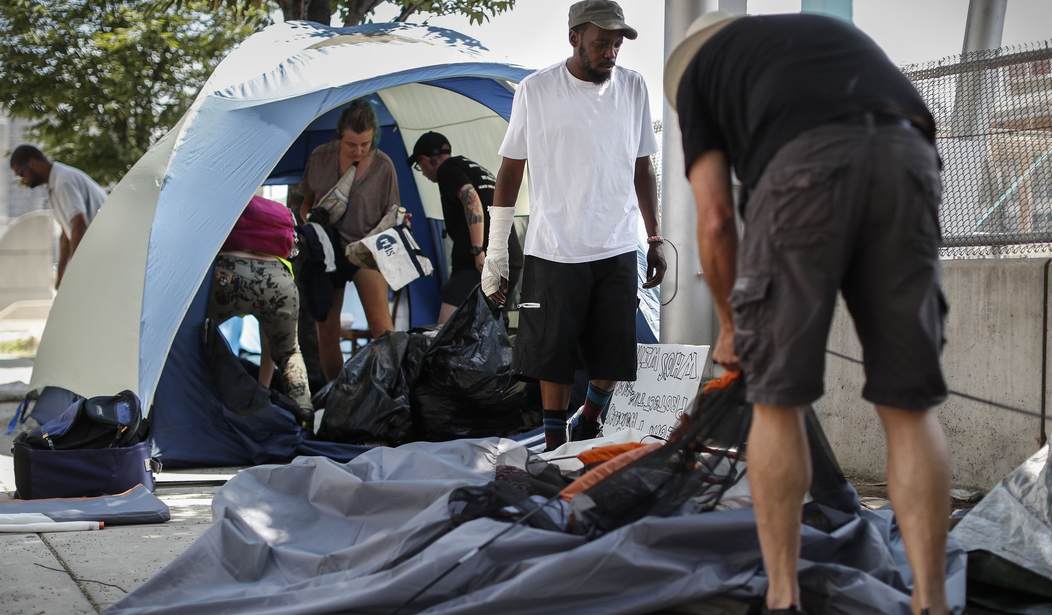Some inconvenient camping spots were recently cleared out in Baltimore. Homeless advocates from a group called the Black Community Development Coalition had erected a significant number of bright red tents right across from City Hall and invited the homeless to move in. The homeless responded enthusiastically and there was soon a small “community” of homeless people living right where the Mayor and the members of the City Council would have to see them every day as they arrived for work. Their plan achieved its goals when the Mayor’s office reached out to the group and came to an agreement where the tent city would be cleared, but Baltimore would funnel another $90 million into “permanent housing” facilities for the homeless and establish other resources for them. Of course, this has been attempted before in many cities – including Baltimore – and it never works. Today we’ll look at why doing the same thing over and over again is still failing to produce different results. (CBS Baltimore)
City leaders have cleared a homeless encampment that sprung up outside of Baltimore City Hall on Wednesday morning.
They have reached an agreement with homeless advocates to provide services to the homeless population.
Members of the Black Community Development Coalition were able to reach an agreement with the mayor’s office to clear the site ahead of the weekend.
The group that set up this effort shouldn’t be considered to be without fault. It was rather cruel to set up a colony of nice, brand-new tents in a central location and invite the homeless to occupy them while they were simultaneously already negotiating a plan to kick them all out again less than a week later. While working to help the homeless in Baltimore, they were also using them as political pawns.
But even if we ignore that aspect of the story, it’s difficult to imagine that this new agreement is going to do much to improve the city’s homelessness crisis. First of all, $90 million probably sounds like a lot of money, but that’s not going to buy all that much “permanent” housing, not to mention all of the other ongoing support any residents of such housing will require, ranging from food and medical care to the question of paying the utilities and other fees associated with the premises every month. A project like this is only “permanent” if it’s sustainable and Baltimore’s budget will not be able to keep shelling out that sort of money on a regular basis.
Beyond those logistical questions, there are some underlying truths that doom these sorts of feel-good projects wherever they are attempted. We’ve seen it before in Los Angeles, San Francisco, Philadelphia, and beyond. And this applies to more societal plagues than just homelessness. If you make it cheaper, easier, and less legally perilous to shoot up drugs in the public square, more people will start shooting up drugs in the public square. If you remove all legal disincentives to urinating or defecating on park benches, more people will do that. And when you make it easier and more attractive for homeless people to present themselves and have all of their needs met at no cost, more homeless people will arrive to take advantage of that opportunity. Word gets around. Any rooms that are established for homeless individuals with this funding will fill up very rapidly and more people will show up wanting similar accommodations.
These types of programs also rarely maintain the support of the productive people who pay taxes and have to shoulder the cost of such situations. As long as you make something free, others who pay for the same thing will want it for free also or at least grow resentful of those getting a free ride while they do not.
Here’s the bottom line. A program such as the one under discussion in Baltimore will, for a time, solve the problems of a specific group of homeless people. That’s great for them. But the city’s real task is not to help those specific individuals until the money runs out. What they need to be doing is solving the overall problem of homelessness itself. Address the root causes that drive the majority of these people out onto the streets. Find out why drug and alcohol rehabilitation programs have such pitiful success rates. The homeless frequently fall into lifestyles involving typically minor crimes. Stop turning a blind eye to the crimes that sustain them. Disincentivize that type of activity and incentivize paths back to gainful legal employment and self-reliance.
Those types of solutions will be wildly unpopular to the progressives who dictate the actions of the Democratic administrations that run Baltimore and most other large cities. But it’s the only way we can even hope to solve this over the long run. If you just keep buying up housing units and filling them with more and more homeless people, productive citizens will throw their hands up and move away. Then you will be left administering a city composed of almost nothing but the homeless. And that’s not going to last very long.







Join the conversation as a VIP Member